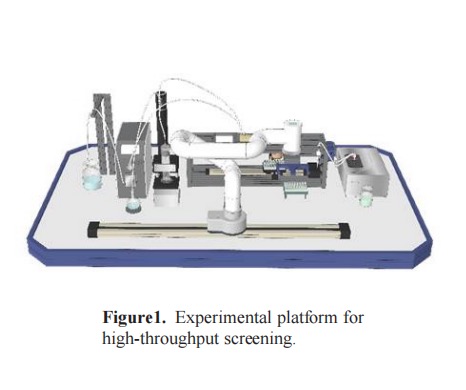EXTENDED ABSTRACT: Nanoliposomes have been widely employed as promising drug delivery vehicles for the treatment of various diseases. However, the large-scale synthesis of drug-loaded nanoliposomes manifesting a highly uniform particle size is impeded by several unmet challenges. Herein a novel helical-blade-strengthened co-flow focusing (HBSCF) device was developed by installing multiple parallel helical blades in a commonly used co-flow focusing microfluidic device. This transformation in the microchannel structure may accelerate the mixing of aqueous and lipid streams in a radial direction, thereby affording the production of nanoliposomes with a significantly lower polydispersity index (PDI) value in terms of particle size. Moreover, a high-throughput experimental platform was developed by employing HBSCF device alongside its integration with various automation modules. Afterwards, based on the obtained large data set of nanoliposomes, a typical machine learning (ML) model pertaining to particle size was established to predict candidate synthesis schemes for the desired average particle size. Therefore, by narrowing the screening ranges through ML, the final synthesis scheme capable of producing liposomes with the desired particle size along with minimum PDI value can be precisely and rapidly obtained using automated experiments based on the same platform. Taken together, an effective integration of the HBSCF synthesis along with an automated high-throughput experimental platform may have broad implications for the industrialization and clinical application of nanomedicine. [1, 2]

Keywords:microfluidics; high-throughput synthesis; nanomedicine
REFERENCES:
[1] H. J. Wang, Z. Y. Lan, R. Z. Tian, M. Ma*, H. R. Chen, et. al., Nano Today, 56, (2024) 102301;
[2] H. Gao, S. Li, D. Pan, Z. Y. Lan, H. R. Chen, M. Ma*, Z. H. Liu*, H. Santos*, et. al., Nat. Commun., 15, (2024) 5398

Ming Ma received Ph.D. degree from University of Chinese Academy of Sciences in 2013. He is now a professor at Shanghai Institute of Ceramics, Chinese Academy of Sciences. His research interests include micro-/nano-scale functional particles for biomedical applications, as well as microfluidic synthesis and high-throughput experimental techniques.